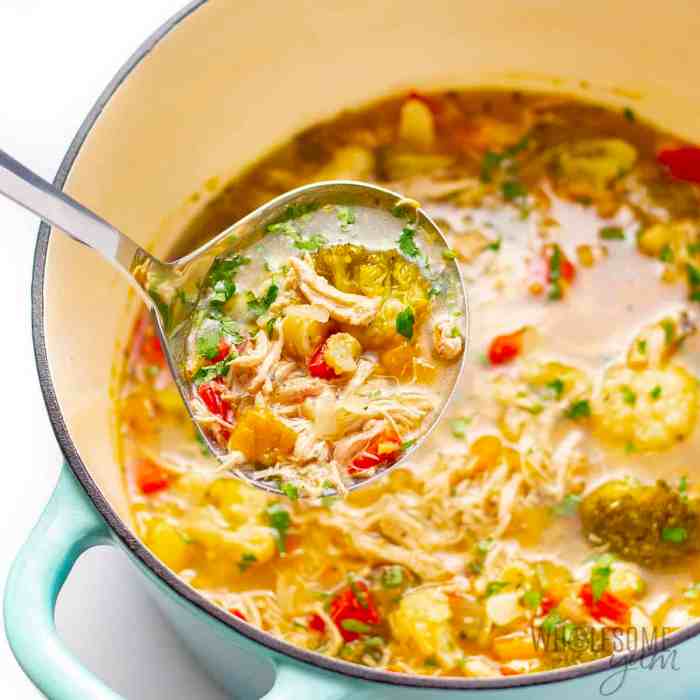Simple Healthy Soup Recipes

Source: tasteofhome.com
Simple healthy soup recipes – Soups offer a convenient and nutritious way to incorporate a variety of vegetables, lean proteins, and whole grains into your diet. Their versatility makes them ideal for busy individuals seeking quick and healthy meals. Simple recipes, in particular, are perfect for beginners, allowing them to build confidence in the kitchen while enjoying delicious and wholesome food.
Introduction to Simple Healthy Soups, Simple healthy soup recipes
Consuming soup as part of a healthy diet offers numerous benefits. Soups are typically low in calories and high in fiber, promoting satiety and aiding in weight management. The abundance of vegetables provides essential vitamins and minerals, contributing to overall well-being. Simple soup recipes are particularly appealing for busy individuals due to their quick preparation time and minimal cleanup.
They require fewer ingredients and less complex cooking techniques, making them accessible to even the busiest schedules.
Three reasons why simple healthy soups are a good choice for beginners are: they are easy to customize to personal preferences; they require minimal cooking skills; and they provide a great platform to experiment with different flavors and ingredients without feeling overwhelmed.
Essential Ingredients for Simple Healthy Soups
Five common and readily available ingredients that form the base of many healthy soups are:
| Onions | Garlic | Carrots | Celery |
| Vegetable Broth |
Onions provide antioxidants and flavor; garlic boasts antimicrobial properties and adds a pungent taste; carrots offer beta-carotene, essential for vision; celery contributes fiber and subtle savory notes; and vegetable broth provides a flavorful base and essential nutrients.
An infographic depicting the versatility of these ingredients would show a central image of a bowl of soup with the five ingredients prominently displayed around it. Arrows would connect each ingredient to various soup types: onions to French onion soup, garlic to minestrone, carrots to carrot ginger soup, celery to chicken noodle soup, and vegetable broth as the base for all.
Different colored backgrounds would represent different soup categories (vegetable, chicken, etc.).
Recipe Ideas: Vegetable-Based Soups

Source: wholesomeyum.com
These three simple vegetable soup recipes emphasize minimal ingredients and maximum flavor:
- Simple Tomato Soup: Sauté diced onions and garlic, add canned diced tomatoes, vegetable broth, and simmer until thickened. Season with herbs like basil and oregano.
- Easy Carrot Ginger Soup: Sauté diced carrots and ginger, add vegetable broth, and simmer until carrots are tender. Blend until smooth and season with salt and pepper.
- Basic Vegetable Soup: Sauté diced onions, carrots, and celery, add your favorite chopped vegetables (broccoli, zucchini, green beans), vegetable broth, and simmer until vegetables are tender. Season with salt, pepper, and herbs.
To maximize flavor without heavy cream or butter, use flavorful broths, sauté vegetables thoroughly to enhance their sweetness, and add herbs and spices generously. These recipes are naturally vegetarian and easily adapted to vegan diets by ensuring all broths and other ingredients are vegan-friendly.
Recipe Ideas: Lean Protein Soups

Source: exorecipes.com
These two recipes incorporate lean protein sources, focusing on quick and slow-cooker methods:
- Quick Chicken and Vegetable Soup (Quick): Sauté diced chicken breast, onions, and carrots. Add vegetable broth and simmer until chicken is cooked through. Add chopped vegetables and cook until tender.
- Lentil Soup (Slow-Cooker): Combine lentils, diced carrots, celery, onions, garlic, vegetable broth, and your favorite spices in a slow cooker. Cook on low for 6-8 hours or high for 3-4 hours.
Choosing lean protein sources like chicken breast, beans, and lentils ensures that your soup remains healthy and low in saturated fat. This contributes to a balanced nutritional profile and helps avoid unnecessary calories.
Tips for Enhancing Flavor and Nutrition
Five simple techniques to enhance soup flavor without excessive salt or sugar are:
- Use high-quality broth.
- Sauté vegetables before adding liquid.
- Add a splash of lemon juice or vinegar.
- Incorporate herbs and spices.
- Finish with a drizzle of high-quality olive oil.
Herbs and spices add depth of flavor and provide additional health benefits, such as antioxidants and anti-inflammatory properties. Common mistakes include overcooking vegetables, leading to mushiness, and not seasoning properly throughout the cooking process.
Storage and Serving Suggestions
Store leftover soup in airtight containers in the refrigerator for up to 3-4 days. Simple healthy soups can be served as a main course, a light lunch, or a side dish. Creative garnishes, such as fresh herbs, a dollop of plain yogurt or a sprinkle of toasted nuts, enhance both the visual appeal and the flavor profile.
Adapting Recipes for Different Seasons
Seasonal vegetables offer peak flavor and nutritional value. Adapt recipes by substituting ingredients based on seasonal availability. For example, use summer squash in summer and butternut squash in the fall.
A seasonal soup recipe calendar might include:
- Spring: Asparagus and pea soup, Spring vegetable soup with fresh herbs, Creamy leek and potato soup.
- Summer: Gazpacho (cold tomato soup), Corn and zucchini chowder, Cucumber and dill soup.
- Autumn: Butternut squash soup, Pumpkin soup, Sweet potato and black bean soup.
- Winter: Hearty beef stew, Cabbage and sausage soup, Broccoli cheddar soup.
User Queries
Can I freeze leftover soup?
Yes, leftover soup can be frozen for up to 3 months. Allow it to cool completely before storing in airtight containers.
How can I thicken my soup?
You can thicken soup by adding a cornstarch slurry (cornstarch mixed with cold water), pureed vegetables, or cooked grains like rice or barley.
What are some good substitutes for salt?
Consider using herbs, spices, lemon juice, or nutritional yeast to enhance flavor instead of relying heavily on salt.
Can I use canned beans in my soup?
Yes, canned beans are a convenient option. Rinse them thoroughly before adding them to your soup to remove excess sodium.
How long can I store soup in the refrigerator?
Store soup in an airtight container in the refrigerator for up to 4 days.
